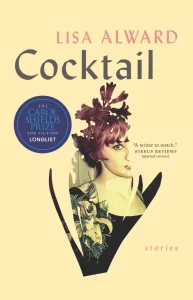By Skylar Kay
Cocktail
by Lisa Alward
Biblioasis (2023)
The stories of Cocktail all revolve around ideas of family, finding belonging, and the pitfalls that come with love—either familial or romantic love. A quick summary described Lisa Alward’s debut short story collection, Cocktail, as “Set across Canada, and across every decade since the 1960’s.” Reading this, I was worried that characters of varying ages in varying locations across varying decades could lose proper distinction, all blurring together and not properly representing the desired place or era. I should have had more faith in Alward. Cocktail delivers carefully crafted stories time and time again with memorable characters in identifiable settings—a clear indication that Lisa Alward is a name to know, and Cocktail a book to read.
From the very start of this collection—the titular story “Cocktail”—Alward delivers on character and setting. I was immediately teleported back in time to my parents’ basement with shag carpet and faux-wood paneling—so perfectly 1970’s. A similar compliment can be given to the story “Orlando 1974” as a family trip to Disneyland evokes the era perfectly through the eyes of a child who describes jellybean shaped pools in motels where patterns in musky carpets draw her and her siblings back year after year. I choose these two stories to discuss setting particularly as they also show Alward’s ability to capture the voice of younger narrators—not an easy task. In “Cocktail” for example, the narrator tells us how she “would tighten all [her] muscles as if to stop the seventies from coming.” In “Orlando 1974” a similar yet distinct voice discusses how her mom’s sunglasses “are the white ones with the huge dark lenses that always make [the narrator] feel as if she’s floated off somewhere” causing the narrator to worry about where her mom is at any given time. These simple yet effective moments of capturing difficult character perspectives entice the reader into stories full of hard to swallow topics—abusive family dynamics and underage sexual awakenings.
Beyond her ability to write distinct characters and settings, Alward’s writing shines in the use of allegory and allusion. In the story “Yellow Hawthorne” Alward immediately evokes Charlotte Perkin Gilman’s “The Yellow Wallpaper”—a perfect hook to force me into the story even after I promised myself I would take a break. The wallpaper in Alward’s version peels away to reveal a drawing of a man and a woman which serves as an allegory for the will-they-won’t-they tension at the core of the story. Another example of Alward’s allegorical prowess comes in the story “Pomegranate” as the idea of food and hunger shifts and morphs throughout the story to discuss not only eating disorders and body dysmorphia, but also the listlessness and lust of a group of teenage girls. Of course, after interactions with food, boys, and thrilling escapes from school, “It doesn’t last. The fullness never does.” Cocktail is resplendent with instances like this—layered allegories culminating in powerful punchy lines that make each story memorable.
My only gripe with this collection comes down to small issues with pacing. Other than the occasional slow burns that were slightly too slow, Alward has multiple twenty-page stories in a row, and I think that, much like varied sentence length, varying story length and splitting those stories up could have benefited the collection.
Lisa Alward’s Cocktail is a memorable collection for its characters, settings, and artistic prowess. From the macro aspects of storytelling like character and setting development to the micro levels of writing poignant lines to capture allegories in unexpected ways, Alward shows off her talent at every turn. This debut collection is well worth the read.
Skylar Kay is an Alberta-based poet and grad school dropout. Since releasing her debut collection, Transcribing Moonlight (Frontenac House, 2022), she has moved back home to Calgary where she looks for the magic in everyday life. Her debut collection was well-received, earning a shortlist nod for the League of Canadian Poets’ Gerald Lampert Memorial Award for Poetry, and won the Book Publishers Association of Alberta’s Robert Kroetsch Award for Poetry.

